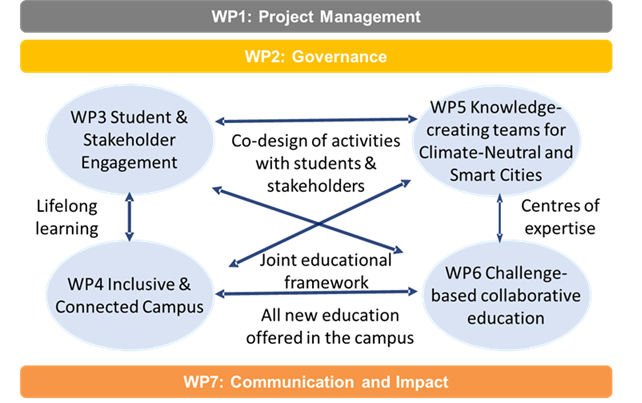- WP1: Project Management (Metropolia)
- WP2: Governance (Metropolia)
- WP3: Stakeholder and student Engagement (Hogent)
- WP4: Inclusive and connected campus (VSB-TUO)
- WP5: Knowledge- Creating Communities for Climate Neutral and Smart Cities (AUAS)
- WP6: Challenge based collaborative Education (Fra)
- WP7: Communication and Impact (IPL)
In 2023, VSB – Technical University of Ostrava, together with partners from the U!REKA consortium, received support within the framework of the European University Initiative. Our joint project U!REKA SHIFT has been selected for funding by the European Commission.
Our vision is to create a profound shift towards climate neutral and ultimately climate positive societies by establishing the U!REKA SHIFT project, which is a step towards the transition to the U!REKA network of European universities, where we are shaping professionals who are able to accelerate the necessary transition. Our universities of applied sciences have a broad and diverse student population, located in large European cities. These students will continue to work in various sectors of the economy and society, making our position crucial for the European path to green and digital transformation.
The aim of the U!REKA SHIFT project is long-term strategic cooperation to integrate education and research, focusing on a sustainable, human and inclusive transition to climate-neutral and smart cities. Universities will work together in teaching and science and research activities, jointly creating new education disciplines (bachelor, master and doctoral), courses for students and the public, mobility and joint research centres. We also want to create a common, sustainable U!REKA campus.
For more information, visit U!REKA website.
The U!REKA centres of expertise will thus connect local ecosystems into one knowledge-generating community. This way of working will allow to contribute more deeply to and build synergies between the European Education Area, the European Research Area, the European Innovation Area and the European Higher Education Area.
3 main areas of the project:
- Smart and sustainable cities
- Transition to a circular society
- Innovative models of governance and citizen involvement
Our consortium proposal received 88 points out of 100. European universities are an ambitious project that will lead to the universities of the future. The initiative aims to promote European values and identity as well as revolutionising the quality and competitiveness of European higher education.
Mission
The U!REKA SHIFT mission consists of three main objectives, underlying our joint vision:
- To establish a sustainable inter-university campus, based on a long-term strategy on education, ensuring seamless mobility and with respect for good governance;
- To become a lighthouse European University for challenge-based and collaborative learning and innovation;
- To shape U!REKA future-proof urban professionals who will accelerate the transition towards climate-neutral and smart cities
